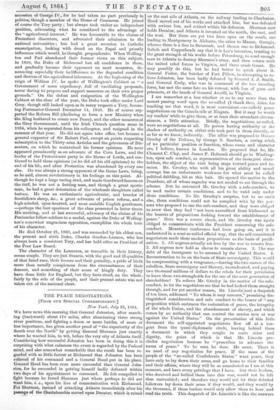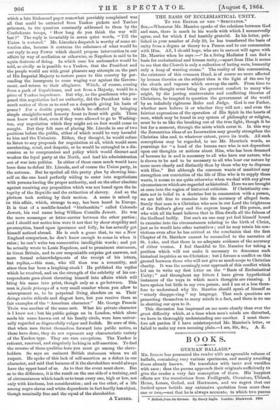THE PEACE NEGOTIATIONS.
[FRO3I OUR SPECIAL CORRESPONDENT.]
New York, July 23, 1884. WE have news this morning that General Johnston, after march- ing (backward) about 170 miles, after abandoning three strong river positions, and fighting a dozen or more battles, of more or less importance, has given another proof of "the superiority of the South over the North" by getting General Sherman just exactly where he wanted him, to wit, before the very city of Atlanta itself. Considering how successful Johnston has been in doing this it is surprising with what calmness the event is regarded by the Federal mind, and also somewhat remarkable that the result has been re- garded with so little favour at Richmond that Johnston has been relieved of his command and a General Hood put in his place. General Hood has been even more successful than General John- ston, for he succeeded in getting himself badly defeated within two days of his appointment to command. He felt compelled to fight because he found Sherman just where perhaps he did not want him, i. e., upon his line of communication with Richmond. For Sherman, instead of attacking Atlanta immediately after his passage of the Ohattahoochie moved upon Decatur, which is round on the east side of Atlanta, on the railway leading to Charleston. Hood moved out of his works and attacked him, but was defeated with serious loss, and retired within his defences. Sherman now holds Decatur, and Atlanta is invested oil the north, the east, and the west. But there are yet two lines open on the south, one leading to Montgomery in Alabama, the other to Macon, Georgia, whence there is a line to Savannah, and thence one to Richmond. Rebels and Copperheads say that it is Lee's intention, trusting to the great strength of his works before Petersburg, to send enough men to Atlanta to destroy Sherman's army, and then return with the united rebel forces to Virginia, and there crush Grant. He may possibly do this, but he had better be quick about it. General Foster, the butcher of Fort Pillow, in attempting to re- lieve Johnston, has been badly defeated by General A. J. Smith, and General Early, who was in command of the late invading force, has met the same fate on his retreat, with loss of guns and prisoners, at the hands of General Averill, in Virginia.
I am somewhat at a loss whether or no to say more than the merest passing word' upon the so-called (I thank thee, John, for teaching me that word, it is most convenient—so-palled) peace negotiations on the Canada side at Niagara. But it may be worth my readers' while to give them, or at least their attendant circum- stances, a little attention. Briefly, the negotiations, so-called, were no negotiations at all. No person having authority or the shadow of authority on either side took part in them directly, or as far as we know, indirectly. The affair was proposed to Horace Greeley of the Tribune, by George N. Sanders, a roving rebel, of no particular position or function, whose name and character are, I believe, known in London. He proposed that he, Mr. Clement C. Clay, and James P. Holcomb should go to Washing- ton, upon safe conduct, as representatives of the insurgent slave- holders, the object of the visit being steps toward peace and re- union. Mr. Greeley, who with all his great ability and moral courage has an unfortunate weakness for what must be called political dabbling, bit at this bait. He opened the matter to the President, all of whose sagacity was not needed to see through the scheme. But he entrusted Mr. Greeley with a safe-conduct, to be used under certain conditions, and to be valid only under those conditions. To Mr. Greeley's surprise, but to no one's else, those conditions could not be complied with by the per- sons who proposed to use the safe-conduct, and they were obliged. to avow that they had "not been accredited from Richmond as the bearers of propositions looking toward the establishment of peace." Here was a severe check, and Mr. ,Greeley was again obliged to communicate with the President concerning the safe- conduct. Meantime conference had been going on, and it is understood in a semi-so-called official way, that the self-constituted negotiators made these modest propositions as the basis of pacifi- cation. 1. All negroes actually set free by the war to remain free. 2. All negroes now held as slaves to remain slaves. S. The war debt of the insurgents to be assumed by the United States. 4. Reconstruction to be on the basis of State sovereignty. This would be compromising with a vengeance,—leaving the two causes of the rebellion, State sovereignty and Slavery, uneradicated, and paying
two thousand millions of dollars to the rebels for their permission to leave these two strongholds for the use of the next generation of slaveholders I To relieve Mr. Greeley in the matter of the safe- conduct, to let the negotiators see that he had looked them straight through, and for yet another reason, Mr. Lincoln:sent a despatch of ten lines, addressed "To whom it may concern," promising dis- tinguished consideration and safe conduct to the bearer of "any proposition which embraces the restoration of peace, the integrity of the whole Union, and the abandonment of slavery, and which comes by an authority that can control the armies now at war against the United States." On the presentation of this little document the self-appointed negotiators flew off at a tan- gent from the quasi-diplomatic circle, leaving behind them a document in which they sought to unite dolor and dignity, the point of which is that Mr. Lincoln pre- cludes negotiation because he "prescribes in advance the terms of peace." To be sure he does. He must. There is no need of any negotiation for peace. If the mass of the
people of the "so-called Confederate States" want peace, they have only to lay down their arms, and go home to their families and their affairs, where they will be as unmolested as I am at this moment, and have every privilege that I have. But their leaders, who deceived and bullied them into this war, would not be left
thus untroubled ; and therefore they would not let their deluded followers lay down their arms if they would, and they would by the thousand, if those leaders would only allow them to hear and read the truth. This despatch of Mr. Lincoln's is like the answers
which a late Richmond pap3r somewhat peevishly complained was all that could be extracted from Yankee pickets and Yankee prisoners, to the question constantly addressed to them by the Confederate troops, "How long do you think the war will last ?" The reply is invariably in seven quiet words, "Till the Union is restored." Mr. Lincoln's despatch is worthy of some at- tention also, because it contains the substance of what would be our reply to any Power which should propose intervention in our affairs by way of mediation or otherwise, as Napoleon is said to be again desirous of doing. In which case his ambassador would be told, as civilly as is possible to a Yankee, that the President and the people would see with great pleasure any attempts on the part of His Imperial Majesty to restore peace to this country by per- suading the insurgents to cease waging war against the Govern- ment, and return to their allegiance. Which, of course, coming from a pack of Republicans, and not from a Majesty, would be a piece of Yankee impudence. But why, as the gentlemen who pro- posed this negotiation had no authority, did the President take so much notice of them as to send on a despatch giving his basis of peace? For a double purpose, which he. effected by bringing simple straightforward honesty front to front with guile. These men knew well that, even if they were allowed to go to Washing- ton, any negotiation which they might set on foot would come to naught. But they felt sure of placing Mr. Lincoln in one of two positions before the public, either of which would be very harmful to him and the Unionists. Either, they thought, he would refuse to listen to any proposals for negotiation at all, which would seem unrelenting, cruel, and despotic, or he would be entangled in a dis- cussion as to compromises and policy which would distract and weaken the loyal party at the North, and lead his administration out of war into politics. In either of these cases much would have been done to defeat Mr. Lincoln, and of course the Union party, in the autumn. But he spoiled all this pretty plan by showing him- self on the one hand perfectly willing to enter into negotiations with persons having the proper authority, and on the other absolute
against receiving any proposition which was not based upon the in- tegrity of the Republic and the extinction of slavery. And so the plotters took nothing by their motion. A name is mixed up in this affair, which, strange to say, has been heard in Europe. It is that of a muddle-headed "blatherskite" called Colorado Jewett, his real name being William Comille Jewett. He was
the mere messenger or letter-carrier between the other parties ; and I should not notice him were it not that by sheer stupidity and
presumption, based upon ignorance and folly, he has actually got himself noticed abroad. He is such a goose that, to use a New England comparison, he don't know enough to come in when it rains ; he can't write ten consecutive intelligible words ; and yet he actually wrote to Louis Napoleon, and to prominent statesmen, in Great Britain, and to our unspeakable surprise got answers, not mere formal acknowledgments of the receipt of his letters, but replies,—this man, who till then was a nonentity, and since then has been a laughing-stock ! He published the replies which he received, and on the strength of the celebrity of his cor- respondents goes about thrusting himself into affairs which will bring his name into print, though only as a go-between. This
man is facile princeps of a very small number whom you allow to
misrepresent us, to be perpetual living, slanders on us. Their doings excite ridicule and disgust here, but you receive them as fair examples of the "American character." Mr. George Francis Train was another of the same sort. What his private character is I know not ; but his public goings on in London, which alone made his name known out of his family circle, were here univer- sally regarded as disgracefully vulgar and foolish. Be sure of this, that when men thrust themselves forward into public notice, as these have done, they do not represent any characteristic variety of the Yankee type. They are rare exceptions. The Yankee is reticent, reserved, and singularly lacking in self-assertion. To find the reverse of those qualities here you must go among the slave- holders. So says an eminent British statesman whom we all respect. He spoke of this lack of self-assertion as a defect in our character, and said that because of it the slaveholders would always have the upper hand of us. As to that the event must show. But as to the difference, it is the result on the one side of a training, and of circumstances which teach us to treat every one, high or low, not only with kindness, but consideration ; and on the other, of a life among negro slaves and white dependents in fact hardly less abject, though nominally free and the equal of the slaveholder.
A YANKEE.































 Previous page
Previous page